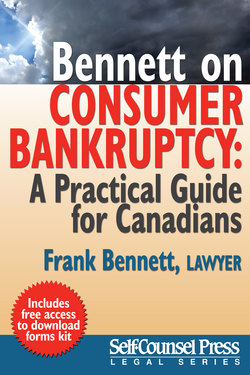Читать книгу Bennett on Consumer Bankruptcy - Frank Bennett - Страница 30
На сайте Литреса книга снята с продажи.
3. Attend an Examination by the Official Receiver
ОглавлениеOnce the consumer debtor is bankrupt, the debtor is required to perform a number of duties. These are set out in more detail in Chapter 8. One of the duties is to attend, if requested by the creditors or by the Superintendent of Bankruptcy, or by the office of the Official Receiver, an examination as to the consumer’s debtor’s assets and liabilities before the first meeting of creditors.
In consumer bankruptcies, there is seldom an examination. However, where the trustee suspects credit card abuse, extravagant living, or gambling, the trustee may call the Official Receiver and request that the Official Receiver conduct an examination. The trustee and the Official Receiver usually set the date and time of the examination, but it is usually held shortly before the first meeting of creditors, if one is requested. The consumer debtor, now bankrupt, must attend and answer questions under oath concerning the debtor’s conduct before bankruptcy, the causes of bankruptcy, and the disposition of the debtor’s property over the last five years. Many of the questions are of a general nature.
On occasion, the Official Receiver obtains information from the trustee and the creditors, and then makes up some new questions relating to the debtor’s property. The Official Receiver’s questionnaire is designed to bring out answers relating to the debtor’s assets that the debtor may have had prior to bankruptcy so that the trustee and the creditors may recover these assets that have been conveyed improperly to friends, family, and business associates. The consumer debtor usually attends the meeting without a lawyer, but may bring a lawyer or friend to assist; it is not usual for the consumer debtor to bring a lawyer to this type of examination. In fact, if the debtor brings a lawyer, the Official Receiver may suspect that there may be problems in the administration. Unlike at the Official Receiver’s examination, the bankrupt is not under oath when attending the first meeting of creditors.
The Official Receiver usually writes the answers on the form, and on additional pages if necessary. At the end of the examination, the Official Receiver asks the consumer debtor to review the answers and sign the form under oath. The consumer debtor should read the material carefully and make any corrections at that time, or as soon as the debtor realizes an error.
At the meeting of creditors, the Official Receiver reads the answers aloud. Creditors may ask additional questions at that time.
